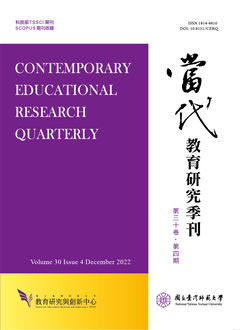

研究目的
本研究旨在探討臺灣大學生由於COVID-19疫情影響使得學習模式被迫由原傳統課室的實體課程改為遠距課程,其同時參與同步與非同步資訊科技輔助通識英語文課程的學習成就、學習態度、學習觀點、及未來教學的反思及挑戰。
研究設計/方法/取徑
本研究以兩班大一通識英語文課程90位同學作為研究對象,透過英語文學習成就測驗與因應疫情設計的課程學習問卷調查,探討學生在疫情下遠距課程的學習成就、學習態度等面向,同時搭配半結構深度訪談瞭解學生的觀點,透過紮根理論反覆閱讀分析逐字稿,探究大學生的質性回饋。本研究以混合研究法收集並分析量化及質性資料,經交叉分析比對,冀望達到質量相輔之研究結果。
研究發現或結論
修課學生在疫情中非自願情況下參與8週遠距課程後,英語文學習成就前後測的進步值達到顯著差異,對於疫情下的遠距教學在易用性、有用性、互動性等面向持較為正面的學習態度。另外,曾重複觀看教學影片的學生,對於每週線上小考的形成性評量持較為認同的態度;低英語文學習成就的學生,對於「線上聊天室留言互動功能」持高度認同。學生的學習觀點可歸納出以下五點:(1)線上課程會放大實體課程中相同、常見的學習問題;(2)線上教學能促進學生適性學習的發展;(3)疫情會加速無所不在的學習需求及接受度;(4)疫情提升自主學習為未來關鍵能力的意識;(5)疫情下的學習反應出實體校園無法被完全取代。
研究原創性/價值
2020年之前的遠距教學文獻,鮮少探討因應重大疫情所採用的教學模式;再者,臺灣受疫情影響相對較低,為全球少數仍能維持常態教學的國家,但這也意味著另一個可能的挑戰:當全球積極發展遠距教學的同時,臺灣因無長時間全面施行線上課程之壓力,在與全球相比迫切性較低的情況下,累積的經驗和相關的探討可能不如其他全面施行遠距教學之國家的進展。此研究於短時間內,因應疫情調整原實體課程為遠距教學,並完整施行8週以上之大學遠距英語文課程,希冀透過實證研究,提供後疫情時代英語文遠距教學設計之參考。另外,本研究學生來自各院系,研究結果呈現出大學學生對於遠距英語文課程綜觀的縮影。
教育政策建議或實務意涵
本研究對未來後疫情時代英語文教學設計,提出以下幾點建議: 第一,線上及實體英語文課程均有其不可取代之優勢,建議採用混成式學習,強化各教學模式之正向學習成效;第二,語言教師應思考如何提升線上互動,進而形成緊密的學習社群;第三,教導學生自我導向學習的能力,培養學生未來自主學習的終身學習能力;第四,善用教育科技強化教學穿透力,提升學生學習動機和興趣。
Purpose
This study aims to explore the English learning achievement, learning attitudes, perceptions, and challenges faced by college students experiencing both synchronous and asynchronous distance English teaching in Taiwan during the COVID-19 pandemic.
Design/methodology/approach
Ninety freshman students in two General English classes of a university in central Taiwan participated in this study. Quantitative data of pre- and post-English achievement tests and a learning attitude questionnaire designed for the pandemic were collected to analyze the learning achievement and learning attitudes of the students. In-depth semi-structured interviews were also conducted and analyzed through Grounded Theory to probe into the perceptions of students pertaining to distance English teaching amid the COVID-19 pandemic. This study adopted a mixed-method research strategy to cross-validate both qualitative and quantitative data in order to further strengthen its findings.
Findings/results
Upon completing an eight-week course of involuntary distance learning, the difference between the pre- and post-English achievement test results of the participating students was significant. The learning attitude of the students was relatively positive for the constructs of ease of use, usefulness, and level of interaction. Moreover, students who re-visited teaching videos developed a more positive attitude toward their online weekly formative assessments. Low achievers with regard to their English ability held a highly positive attitude toward the text-based message function on the synchronous meeting software. Other qualitative findings include the following: (1) online courses could amplify some existing problems occurring within physical classrooms, (2) online learning will facilitate the adaptive learning experience, (3) the pandemic will expedite the need for, and acceptance of, ubiquitous learning, (4) the pandemic raises awareness of the reality that autonomous learning will be key for future learning, and (5) the physical campus cannot 100% be replaced by online learning, as reflected in the learning experience deriving from the pandemic.
Originality/value
Distance learning has long been available. However, prior to the year 2020, very little research had been conducted on distance learning during pandemics. Furthermore, due to the low number of cases of COVID-19 in Taiwan, Taiwan has been one of the few countries worldwide that could maintain physical classroom teaching. This phenomenon, in the meantime, could also potentially lead to the level of digital learning related experience and research in Taiwan falling behind that of other countries in the long term due to a relatively lower need for executing distance learning. This empirical research attempts to provide evidence-based results for future reference on pedagogy design of distance English teaching in the post-pandemic era. The group of participants involved in this study was composed of students from various colleges, consequently revealing more comprehensive perceptions of college students toward distance education.
Implications for Policy/Practice
The implications of this study include the following. First, both online and physical learning have their merits. Thus, blended learning could be an ideal mode for retaining the essence of both online and onsite teaching. Second, language instructors should strengthen online interactions to build an active learning community. Third, students need to be taught self-directed learning skills so that they can become autonomous, independent life-long learners. Fourth, educational technology should be employed to enhance teaching impact and intensify learning motivation and interests.

本著作係採用創用 CC 姓名標示-非商業性 3.0 台灣 授權條款授權.
本刊國立台灣師範大學教育研究與創新中心
106台北市和平東路一段162號 | 電話: 02-7749-3670 | E-mail: cerecerq@gmail.com
教創中心 | 師大 | 電子報 | 線上投審系統
本刊由國家科學及技術委員會人文社會科學研究中心補助經費
© 2014 CERI-NTNU
